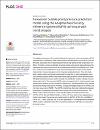A reservoir bubble point pressure prediction model using the Adaptive Neuro-Fuzzy Inference System (ANFIS) technique with trend analysis
| المؤلف | Alakbari, Fahd Saeed |
| المؤلف | Mohyaldinn, Mysara Eissa |
| المؤلف | Ayoub, Mohammed Abdalla |
| المؤلف | Muhsan, Ali Samer |
| المؤلف | Hussein, Ibnelwaleed A. |
| تاريخ الإتاحة | 2023-07-12T07:28:16Z |
| تاريخ النشر | 2022 |
| اسم المنشور | PLoS ONE |
| المصدر | Scopus |
| الملخص | The bubble point pressure (Pb) could be obtained from pressure-volume-temperature (PVT) measurements; nonetheless, these measurements have drawbacks such as time, cost, and difficulties associated with conducting experiments at high-pressure-high-temperature conditions. Therefore, numerous attempts have been made using several approaches (such as regressions and machine learning) to accurately develop models for predicting the Pb. However, some previous models did not study the trend analysis to prove the correct relationships between inputs and outputs to show the proper physical behavior. Thus, this study aims to build a robust and more accurate model to predict the Pb using the adaptive neuro-fuzzy inference system (ANFIS) and trend analysis approaches for the first time. More than 700 global datasets have been used to develop and validate the model to robustly and accurately predict the Pb. The proposed ANFIS model is compared with 21 existing models using statistical error analysis such as correlation coefficient (R), standard deviation (SD), average absolute percentage relative error (AAPRE), average percentage relative error (APRE), and root mean square error (RMSE). The ANFIS model shows the proper relationships between independent and dependent parameters that indicate the correct physical behavior. The ANFIS model outperformed all 21 models with the highest R of 0.994 and the lowest AAPRE, APRE, SD, and RMSE of 6.38%, -0.99%, 0.074 psi, and 9.73 psi, respectively, as the first rank model. The second rank model has the R, AAPRE, APRE, SD, and RMSE of 0.9724, 9%, -1.58%, 0.095 psi, and 13.04 psi, respectively. It is concluded that the proposed ANFIS model is validated to follow the correct physical behavior with higher accuracy than all studied models. 2022 Alakbari et al. This is an open access article distributed under the terms of the Creative Commons Attribution License, which permits unrestricted use, distribution, and reproduction in any medium, provided the original author and source are credited. |
| راعي المشروع | Special thanks to the Centre of Research in Enhanced Oil Recovery (COREOR), Petroleum Engineering department, Universiti Teknologi PETRONAS for supporting this work. |
| اللغة | en |
| الناشر | Public Library of Science |
| الموضوع | accuracy Article average absolute percentage relative error average percentage relative error bubble point pressure correlation coefficient fuzzy system prediction pressure root mean squared error statistical error trend study fuzzy logic machine learning lead Fuzzy Logic Lead Machine Learning |
| النوع | Article |
| الصفحات | - |
| رقم العدد | 8-Aug |
| رقم المجلد | 17 |
الملفات في هذه التسجيلة
هذه التسجيلة تظهر في المجموعات التالية
-
الهندسة الكيميائية [1182 items ]
-
الأبحاث [500 items ]


